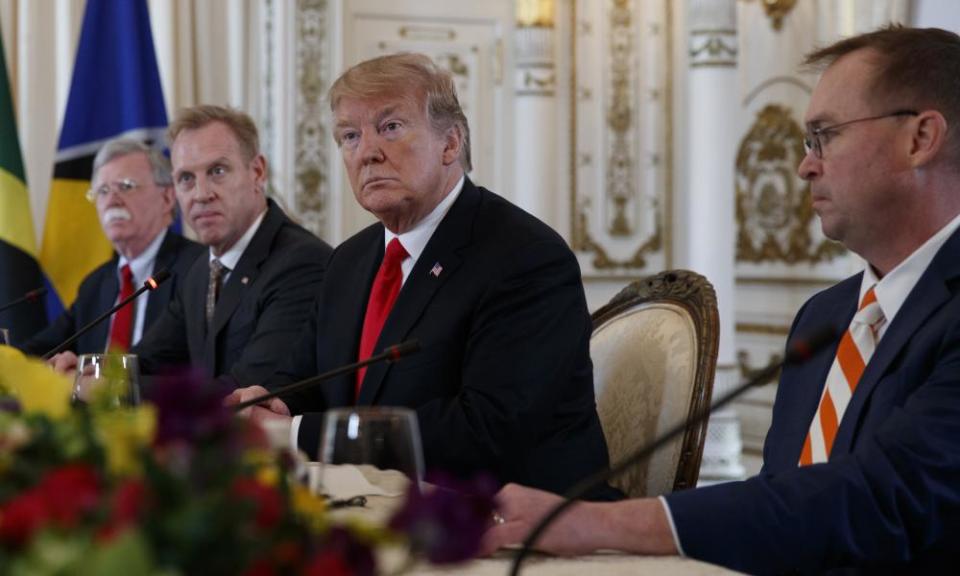Donald Trump's preference for 'acting' senior officials alarms experts and allies

Donald Trump has surrounded himself with an increasing number of temporary officials in his cabinet, raising fresh concerns over the president’s influence across US departments and agencies amid an absence of leadership.
The resignation of the homeland security secretary, Kirstjen Nielsen, on Sunday marked the latest departure of a top-level officeholder amid an unprecedented number of vacancies in the upper echelons of Trump’s administration.
And as 15 notable leadership posts remain unfilled, the president is showing no signs of backing away from his self-confessed preference for appointing officials in an “acting” capacity.
Sign up for the US morning briefing
Experts said the lack of permanent appointments, especially among cabinet officials, leaves key government functions without a clear mandate and more vulnerable to outsize influence from Trump.
“The impact of this lack of policy influence means, in practical terms, that policy decisions are devoid of a critical ingredient – whether career officials believe that an issue can be implemented in a particular manner,” said Joel Rubin, who served in Barack Obama’s administration as a deputy assistant secretary of state and is now the president of Washington Strategy Group.
“The result is that the policy leaders’ decisions on that issue are doomed to fail for lack of thorough vetting.”
Nielsen’s abrupt exit came amid a reported purge of the Department of Homeland Security, a focal point of Trump’s ire stemming from his frustration over immigration policy.
Trump subsequently named Kevin McAleenan as the acting head of the department, adding to a growing list of officials indefinitely placed in leadership roles without the approval of Congress.
Months have often passed without a replacement for cabinet officials at some of the most powerful departments and agencies.
The Federal Aviation Administration (FAA), which has faced widespread scrutiny amid safety concerns with the Boeing 737 Max 8, was led by an acting administrator for over a year. Trump nominated a new FAA administrator last month following the crash of an Ethiopian Airlines jetliner and subsequent worldwide grounding of all Boeing 737 Max planes.
Last week, Trump withdrew his nomination of Ron Vitiello as the new head of Immigration and Customs Enforcement (ICE). It was confirmed on Wednesday that Vitiello, who has served as the agency’s acting director since June of 2018, is expected to leave his post by the end of the week as part of the reshuffling within the DHS.
Trump has yet to nominate a new defense secretary, despite the fact that James Mattis, who occupied the post for the first two years of the administration, resigned in December. An acting director has been at the helm of the Federal Emergency Management Agency (Fema), which is tasked with emergency and disaster response, for nearly two months.
The list of acting officials goes on, spanning the UN ambassador, interior secretary, budget director and commissioner of Custom and Border Protection. Even Trump’s chief of staff, Mick Mulvaney, was named to the post on a temporary basis.
Trump has acknowledged he is in no rush to nominate permanent officials to his cabinet, stating in a February interview: “It’s easier to make moves when they’re acting.
“I sort of like ‘acting’. It gives me more flexibility,” Trump said.
“Do you understand that? I like ‘acting’. So we have a few that are ‘acting’. We have a great, great cabinet.”

Donald Trump is flanked by the acting defense secretary, Patrick Shanahan, left, and Mick Mulvaney, his acting chief of staff, in Mar-a-Lago.Photograph: Carolyn Kaster/AP
The approach is not unlike how the president ran his eponymous Trump Organization, viewing himself as the sole individual in charge and constantly fixated on the notion of fealty from those working under him.
But Christopher Lu, the White House cabinet secretary under Obama, said the president was misguided in his belief that “acting” officials work to his benefit.
“He thinks it gives him more sway, because they will bend to his will to try to curry favor,” Lu said. “The truth is he’s undermining his own ability to enact changes by not putting confirmed officials in these positions.
“If you want to change the policy direction of an agency,” he added, “you really need political leadership in there.”
All cabinet-level positions, with the exception of the White House chief of staff, require Senate confirmation.
Trump’s “acting” officials have thus bypassed the scrutiny and vetting that is required of the US Congress, prompting frustration even among members of his own party.
“It’s a lot. It’s way too many,” James Lankford, a Republican senator from Oklahoma, said earlier this year.
“You want to have confirmed individuals there, because they have a lot more authority to be able to make decisions and implement policy when you have a confirmed person in that spot.”
The vacancies are not limited to cabinet posts.
An analysis by the Partnership for Public Service and the Washington Post found that, as of February, the White House had not made nominations for 150 out of 705 Senate-confirmed positions.
The end result was “decentralized policymaking”, said Matt Glassman, a senior fellow at the Government Affairs Institute at Georgetown University.
The key players in Washington were meanwhile less likely to take seriously those in temporary positions of power, he added, given the uncertainty over their future.
“An acting official in some ways is like a substitute teacher,” Glassman said. “And substitute teachers have a tough time controlling the classroom.”

